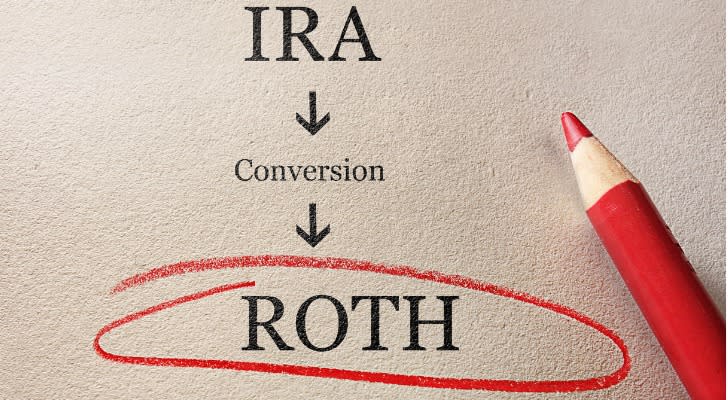I want to do a Roth conversion from my traditional IRA in the amount of $250,000. It’s my understanding that I have to pay the income tax on the $250,000. Can that tax be paid from the funds in the IRA or do I have to pay the tax outside of the IRA?
– Kevin
This one is straightforward. The IRS doesn't care where the money comes from. As long as you cut them a check they'll be happy!
All kidding aside – yes, the $250,000 is included in your gross income. You can pay the tax bill using either the converted funds or money from other sources, but the difference is potentially substantial. You may want to consider using non-IRA funds to pay the tax bill if it’s an option for you.
A financial advisor can help you make important retirement planning decisions, like when to do a Roth conversion and in what amount. Connect with a financial advisor.
To understand the tax implications of a Roth conversion, it's helpful to think about what this type of transfer does. A Roth conversion allows you to move money from a traditional, tax-deferred retirement account into a Roth IRA.
The main idea behind tax-deferred retirement accounts is in the name. When you contribute to a traditional IRA, 401(k) or similar account, you get to deduct that amount from your current gross income, thereby avoiding the tax liability for that year. Instead, that tax liability is deferred until you withdraw the money from the account. This deferral also applies to the growth, dividends and interest the money earns.
Typically, this tax bill comes due when you start making withdrawals in retirement. However, moving that money into a Roth IRA also removes it from the account, triggering income taxes. Assuming that you made deductible contributions (not non-deductible contributions) to your IRA, the converted funds are added to your gross income for the year and increase your tax liability. (A financial advisor with tax planning expertise can be a valuable resource as you make important financial decisions, especially around retirement.)
How to Pay Roth Conversion Taxes
You can pay the tax bill on a Roth conversion using a portion of the converted balance or money you have outside of your IRA. Here’s a closer look at the two options:
Using the Converted Funds
As a practical matter, many people rely on the converted funds to pay the income taxes on the conversion. If you don't have money outside of the IRA to cover the taxes, this may simply be your only option. If that's the case you can normally have the financial institution withhold the money when they do with conversion.
Paying with Other Savings
If you have enough savings outside of your IRA to pay the tax bill, this is almost always going to be the better option from a retirement savings perspective. By taking this approach, you’ll not only avoid potential tax penalties associated with using the converted funds to pay your taxes, but you’ll also ensure that the entire converted balance grows tax-free in your Roth account. Of course, be mindful to not deplete your emergency savings.
Which Is better?
As an example, let's assume someone in the 24% marginal tax bracket is converting $100,000 and they have $24,000 in cash, which they can use to pay the tax bill:
If they pay the tax bill using the converted funds, they’ll only have $76,000 leftover in their Roth IRA after taxes, along with their $24,000 in a taxable savings or brokerage account.
If they use the cash savings to pay the tax bill, the full $100,000 would go into the Roth IRA.
The big difference comes in the way the two accounts are taxed. Since Roth IRAs grow tax-free, it's much more efficient to maximize the savings there, especially if you plan to invest that money for a while. (Consider matching with a financial advisor if you need help tackling retirement planning scenarios like this one.)
Special Consideration if Under 59 ½
If you haven’t yet reached age 59 ½, it’s important to consider the 10% early withdrawal penalty. The conversion itself is not subject to this penalty, but any amount you take out to pay taxes will be. This makes paying the conversion taxes with cash savings even more valuable if you’re under age 59 ½.
Furthermore, the penalty applies whether you have a portion of the money withheld for taxes at the time of the conversion or you withdraw the money from your Roth IRA when you file your taxes. Withdrawing these funds less than five years after a conversion violates the five-year rule on Roth conversions and triggers the 10% early withdrawal penalty if you haven’t reached age 59 ½. (This five-year rule can be confusing, but a financial advisor can help you navigate it and potentially avoid costly tax penalties.)
Bottom Line
You can pay the tax bill on a Roth conversion from any source. You can have a portion of the conversion withheld; you can wait until tax time and withdraw from the Roth balance; or you can use outside savings to cover the tax liability. Keep in mind that early withdrawal penalties may apply if you if you use IRA funds to pay the tax bill. If you are able, paying with outside dollars is typically the far better option.
Tips for Finding a Financial Advisor
Hiring a financial advisor isn’t just about finding someone who can get the biggest return on your investment. That’s important, of course, but you should also look to work with an advisor whose services and areas of specialty align with your needs. For instance, if you need help organizing your estate and making a plan for how can pass your wealth on in a tax-efficient manner, you’ll want to find an advisor who offers estate and legacy planning services. After all, not all advisors specialize in these areas.
Finding a financial advisor doesn't have to be hard. SmartAsset's free tool matches you with up to three vetted financial advisors who serve your area, and you can have a free introductory call with your advisor matches to decide which one you feel is right for you. If you're ready to find an advisor who can help you achieve your financial goals, get started now.
Brandon Renfro, CFP®, is a SmartAsset financial planning columnist and answers reader questions on personal finance and tax topics. Got a question you'd like answered? Email AskAnAdvisor@smartasset.com and your question may be answered in a future column.
Please note that Brandon is not an employee of SmartAsset and is not a participant in SmartAsset AMP. He has been compensated for this article. Some reader-submitted questions are edited for clarity or brevity.
Photo credit: ©iStock.com/zimmytws, ©iStock.com/shapecharge
The post Ask an Advisor: I’m Going to Do a Roth Conversion on $250k. Can I Use the Converted Funds to Cover the Taxes? appeared first on SmartReads by SmartAsset.

